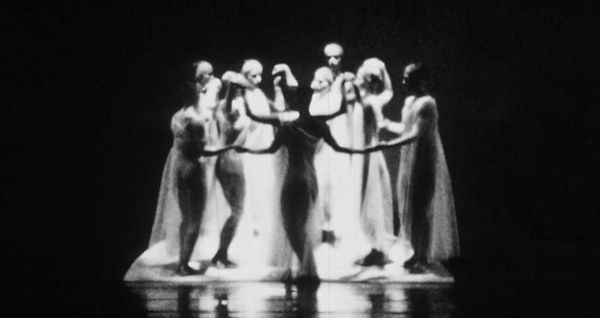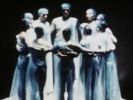Eye For Film >> Movies >> Four Journeys Into Mystic Time (1979) Film Review
Four Journeys Into Mystic Time
Reviewed by: Chris

This is a set of four thematically related dance pieces: Mysterium, Trans, One-2-3, and Initiation. They comprise the dancers in their own pools of light, with no external props. As if somehow distinct from space and time. The dances are in strong contrast to Clarke’s earlier dance films (Dance In The Sun, Bullfight and A Moment In Love). The choreographer is Marion Scott.
Mysterium. There is a long thrumming sound, as from Tibetan bells (or bowls). Two dancers perform a geometrically interesting piece of body balance / body sculpture. The light casts shattered red shadows across the floor in what is otherwise a sea of darkness. The dancers wear skin-tight opaque outfits and have an almost androgynous (or sexually part-formed) appearance.

Trans. A solo contemporary dance. The dancer appears to be wearing a trouser suit of gauze-like material. The shadows on the dancer’s body have been carefully manipulated – probably during filming and then by additional processing. This gives a trailing movement and other visually notable special effects. At the start of the piece, it almost looks as if there is another body contained in the dancer’s body. The ‘floor’ is simply a pool of golden light in a sea of darkness. Eventually the darker body becomes one with the darkness.
One-2-3. A figure in a suit, tie, bowler and veil explores the changing colour of the screen. A second figure, white clad, does the same. Each figure originated from a simple white pool outline. A third figure enters wearing a ‘glam’ costume. The three meet. The man removes the veil.
Initiation. The most impressive of the four pieces and with a larger complement of dancers. Initially there is a gauze-clad figure, lit from beneath. (The costumes and spirituality of this section in particular remind me of the style of dance pioneer Ruth St Denis - it's a style connected to Clarke through her training in the Doris Humphrey-Charles Weidman technique and Denishawn dance.) The first figure could represent a high priestess or shaman – whoever guards and opens the gate of initiation. Lighting starts from a white core light, to which blue is added. Nine figures approach and circle the first one. Tibetan bells again. She draws them into the light. Two circles form. Five join hands and rotate around the central figure clockwise as an inner circle moves anticlockwise. From some body balance dancing off to one side, one figure carries another into the circle. The costumes appear to be skin tight blue with a white gauze over the top. The carried figure awakens or comes to life. At this point one might consider the similarity to the pagan rite of the Green Man of Spring or countless similar rituals from different cultures. But the dance is minimalist to make it symbolic, fitting any, rather than the specific. It is one of the most creative dance pieces I have ever witnessed. The white moonlike disk becomes red, and the other figures dance and cavort (without veils). There is a single figure astride the white orb.
Reviewed on: 15 Jul 2008













